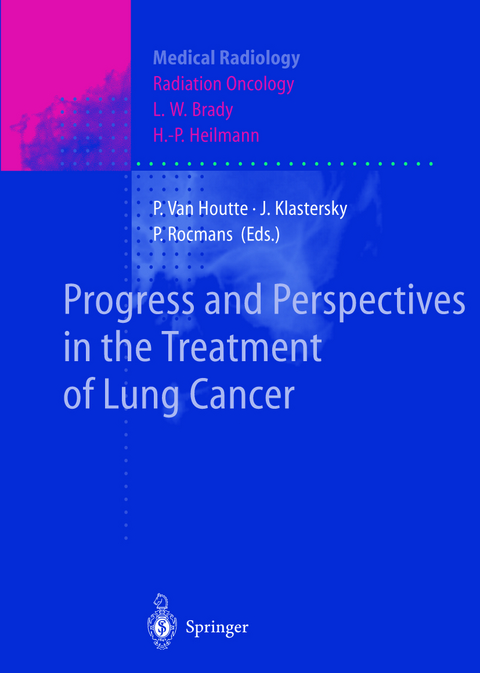
Progress and Perspective in the Treatment of Lung Cancer
Springer Berlin (Verlag)
978-3-642-64140-4 (ISBN)
Lung cancer is not a single disease process but is a group of biologically variable diseases. Therefore, accurate and complete diagnosis along with complete workup of the patient prior to decision-making in treatment is essential to devise the most appropriate treatment strategy. In North America adenocarcinoma of the lung now accounts for about 40% of all lung cancers and stage for stage these tumors have a poorer prognosis than squamous cell cancers of the lung. Many prognostic indicators have been identified such as genetic markers and neuroen docrine differentiation, which have important roles to play in identifying the patients who would benefit most from active treatment. Screening and early detection have been thought to be sine qua non in early diagnosis of lung cancer. However, a number of controlled trials assessing the value of annual screening for lung cancer have demonstrated in some studies that chest X-rays and/or cytology screening may improve stage distribution, resectability, survival, and fatality but has not shown an impact on disease-specific mortality rates. The Mayo Clinic lung project compar ing quarterly chest X-rays and sputum cytology with routine care in more than 10 000 male smokers indicated that 5-year survival following treatment in the screened patients was better than rates in contemporary clinical practice. However, arguments have been ad vanced as to factors that might have biased the clinical benefits. Other trials are currently under way to deal with this issue along with new molecular markers that may enhance sputum sensitivity.
1 Prognostic Factors: From Clinical Parameters to New Biological Markers.- 2 Radiological Evaluation of Intrathoracic Extension and Resectability of Non-Small Cell Lung Cancer.- 3 Positron Emission Tomography: A New Tool in Diagnosing Staging and Treatment Monitoring of Lung Cancer.- 4 Exclusive Surgery for Stage III Disease: Is It Still Ethical?.- 5 Induction Chemotherapy with or without Radiotherapy Followed by Surgery in Non-Small Cell Lung Cancer.- 6 Adjuvant Treatment in Non-Small Cell Lung Cancer.- 7 Induction or Concurrent Chemotherapy and Radiation Therapy for Locally Advanced Non-Small Cell Lung Cancer.- 8 Exclusive Radiotherapy for NSC Lung Cancer.- 9 Three-Dimensional Conformal Radiotherapy in Treatment of Bronchogenic Carcinoma.- 10 Endoluminal Brachytherapy: A Curative Modality?.- 11 Integration of Radiation Therapy and Chemotherapy for Small Cell Lung Cancer.- 12 The Role of Prophylactic Cranial Irradiation: Benefits and Late Effects.- 13 Fractionation as a Biological Dose Modifier.- 14 Biochemical and Biological Dose Modifiers for Irradiation of Lung Cancers.- 15 Intraoperative Radiotherapy for Lung Cancer.- 16 Should all Stage IV Non-Small Cell Lung Cancer Be Treated Palliatively?.- 17 Intensive Therapy of Small Cell Lung Cancer: A Review of Recently Published Data.- 18 Best Supportive Care or Chemotherapy for Stage IV Non-Small Cell Lung Cancer.- 19 Do We Have the Real Tools to Evaluate Lung Radiotoxicity?.- 20 Treatment Indications and Clinical Target Volume.- 21 Radiotherapy and the Challenge of Palliation.- 22 New Drugs in Lung Cancer.- 23 Supportive Treatment in the Management of Lung Cancer.- List of Contributors.
| Erscheint lt. Verlag | 18.9.2011 |
|---|---|
| Reihe/Serie | Medical Radiology | Radiation Oncology |
| Vorwort | L.W. Brady, H.-P. Heilmann |
| Zusatzinfo | X, 280 p. 3 illus. in color. |
| Verlagsort | Berlin |
| Sprache | englisch |
| Maße | 193 x 270 mm |
| Gewicht | 645 g |
| Themenwelt | Medizinische Fachgebiete ► Innere Medizin ► Pneumologie |
| Schlagworte | Atmen • carcinoma • Positron Emission Tomography • Radiaton Oncology • Staging • Surgery • Tumor |
| ISBN-10 | 3-642-64140-7 / 3642641407 |
| ISBN-13 | 978-3-642-64140-4 / 9783642641404 |
| Zustand | Neuware |
| Haben Sie eine Frage zum Produkt? |
aus dem Bereich


